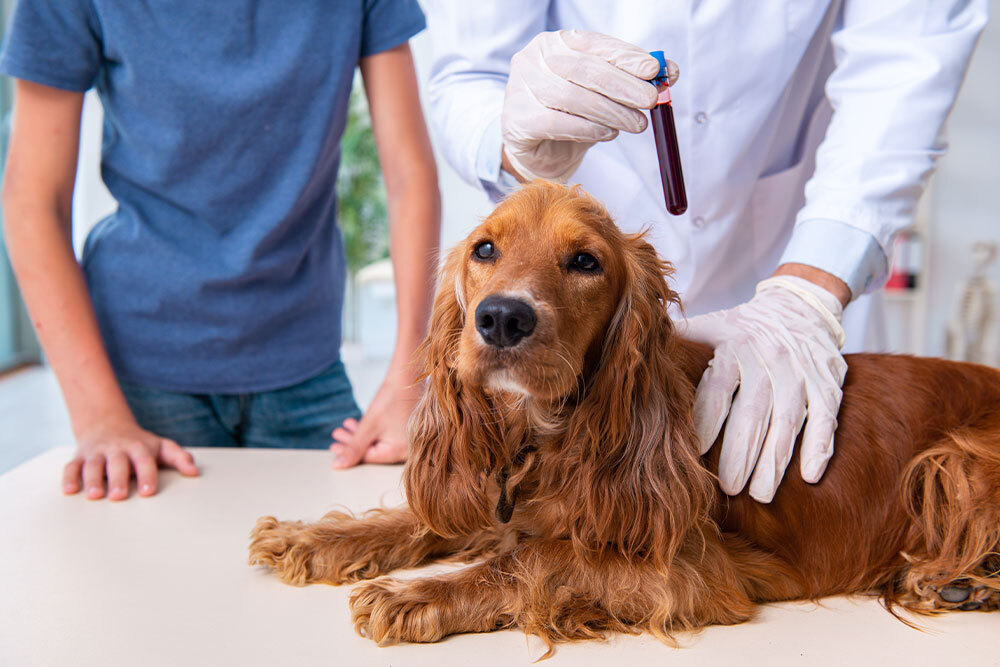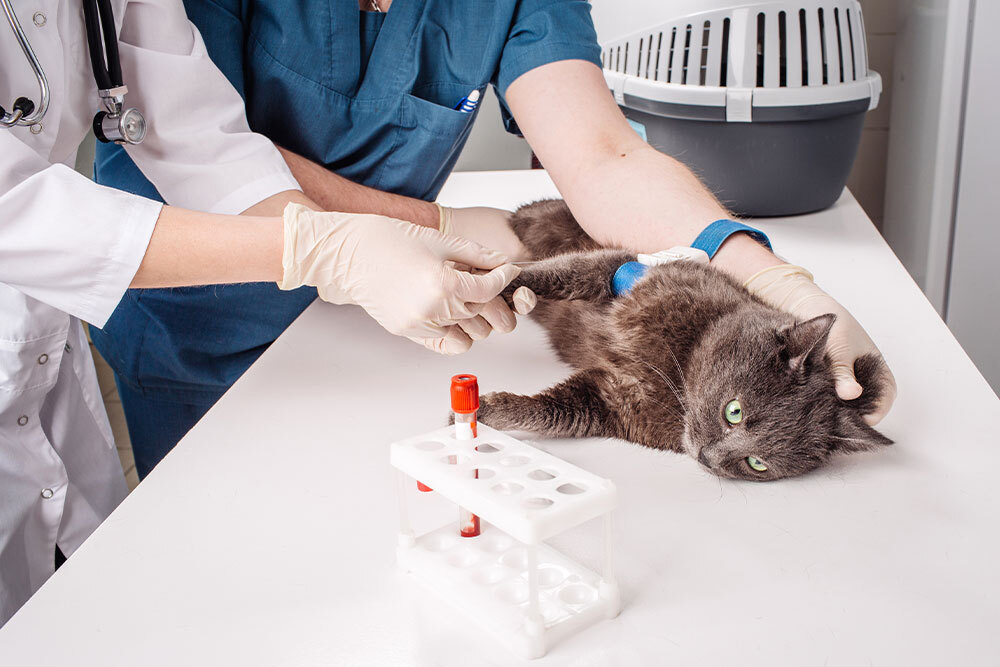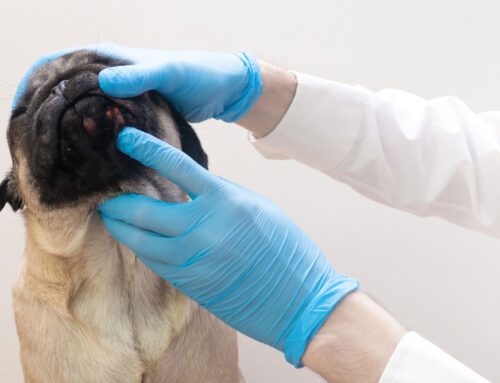Annual Bloodwork in Pets: Why It Matters More Than You Think
You’ve scheduled the checkup, kept vaccines up to date, and maybe even managed a nail trim without too much fuss. But then your vet mentions annual bloodwork, and you wonder- is that really necessary?
At Palisades Veterinary Hospital in Fountain Hills, Arizona, we hear this question often. The truth is, bloodwork is one of the most valuable tools we have for protecting your pet’s health. It helps us catch problems early, monitor chronic conditions, and keep your pet feeling their best year after year.
What Is Annual Bloodwork?
Annual bloodwork is a routine wellness screening that gives us a window into how your pet’s body is functioning on the inside- long before signs of illness show up on the outside.
Most wellness panels include:
- Complete Blood Count (CBC): Evaluates red and white blood cells and platelets. This helps detect anemia, infection, inflammation, or blood disorders.
- Chemistry Panel: Assesses liver and kidney function, blood sugar, electrolytes, and more.
- Thyroid or Hormone Tests: Especially important for senior pets or those showing subtle behavior changes.
- Additional Tests: Depending on age, breed, or symptoms, we may recommend heartworm screening or more advanced panels.
The Merck Veterinary Manual offers a helpful overview of these tests and what they can reveal.
Why Annual Bloodwork Matters
Your pet can’t tell you when something feels off- and many health conditions don’t show visible signs until they’re well advanced. That’s where bloodwork comes in. By checking internal systems on a regular basis, we can catch issues long before your pet seems sick.
Early detection means more treatment options, less intensive care, and better long-term outcomes. Here are just a few of the common conditions we regularly catch through routine lab work:
- Chronic Kidney Disease (CKD): Especially common in aging cats, kidney disease often progresses quietly. Bloodwork helps us catch early signs- like subtle shifts in kidney values- before your cat starts drinking more or losing weight. Learn more about CKD in cats.
- Liver Disease: The liver can compensate for damage for a long time, which means symptoms often show up late. But blood enzyme changes may appear much earlier, giving us a chance to manage the issue before it becomes more serious.
- Thyroid Imbalances: Dogs are prone to hypothyroidism, which can cause lethargy, weight gain, and skin issues. Cats, on the other hand, often develop hyperthyroidism- leading to weight loss, increased appetite, and restlessness. Both are highly treatable when caught early. Learn more from Cornell and AAHA.
- Diabetes: Many pets are only diagnosed after they start showing classic symptoms like excessive thirst or weight loss. Blood sugar testing can catch it earlier, giving us a head start on managing the condition. Here’s how AAHA explains it.
Even if your pet’s results are normal, that’s valuable too. Establishing a healthy baseline helps us compare values year after year, making it easier to spot changes as they age.
Tailoring Testing to Life Stage
Your pet’s age plays a big role in what we test for and how often we run screening panels. Senior pets, in particular, benefit from more frequent monitoring. Age-related diseases can develop quietly, and regular bloodwork helps us stay one step ahead. Zoetis Petcare offers helpful information on the value of preventive screening as pets age.
What the Results Tell Us
Bloodwork gives us more than just numbers. It provides:
- A baseline to compare against in future illness
- Insight into organ function and systemic health
- Clues for tailoring medications and avoiding drug interactions
- Early detection of metabolic or endocrine disorders
- A foundation for personalized care planning
These results become especially important when your pet needs surgery, starts a new medication, or experiences sudden changes in behavior or appetite.
Worried About Stress or Cost?
We understand that every test comes with questions. But annual bloodwork is one of the most cost-effective ways to invest in your pet’s future. Catching problems early often means simpler treatment, fewer complications, and lower long-term expenses.
And as for the experience itself? Our team uses gentle handling, distraction techniques, and comforting environments to make the visit as stress-free as possible. We’re trained to spot signs of discomfort and work at your pet’s pace. If you’re nervous, just let us know. We can walk you through every step.
What Happens If Something Abnormal Shows Up?
If your pet’s results show something out of range, don’t panic. We’ll take the time to explain what it means, whether additional testing is needed, and what treatment options are available. Our in-house laboratory and advanced diagnostics help us get answers quickly, so we can act fast if needed.
Preparing for Your Pet’s Bloodwork
Want to make the visit smoother? Here are a few tips:
- Ask us about fasting your pet- it’s needed for some tests
- Keep them hydrated before the visit
- Bring a list of medications and supplements
- Minimize stress with pheromone sprays, treats, or a favorite blanket
For anxious pets, we may recommend calming support ahead of time. If you’re unsure, just ask- we’re happy to help.
Skipping Bloodwork Comes With Risks
While we understand the desire to avoid extra tests, skipping bloodwork can mean missing early warning signs. Diseases like kidney failure, diabetes, liver disease, and even cancer can progress silently. This article from Pet Health Network outlines the risks of waiting too long.
Think of bloodwork as a routine safety check. It may catch something- or it may confirm that your pet is thriving. Either way, it gives you clarity.
Frequently Asked Questions
Do healthy pets really need bloodwork?
Yes. Baselines are critical, and many diseases develop with no early signs.
How often should it be done?
Once a year for healthy adults. Every six months for seniors or pets with medical conditions.
Does it hurt?
Just a small poke. Most pets tolerate it well and bounce back immediately.
When will I get results?
Most results are back within 1-2 days. For urgent cases, we expedite testing through our on-site lab.
Committed to Proactive, Personalized Care
At Palisades Veterinary Hospital, we believe that the best care is proactive. That’s why we recommend annual bloodwork as part of your pet’s preventive medicine plan. It’s a powerful way to detect hidden health problems, create more accurate diagnoses, and ensure your pet stays healthy at every stage of life.
Whether your pet is due for their wellness visit or you’re looking for more information, we’re here to help. You can learn more about our services, meet our team, or contact us to schedule an appointment.
Let’s keep your pet’s health on track- starting with what we can’t see.









Leave A Comment